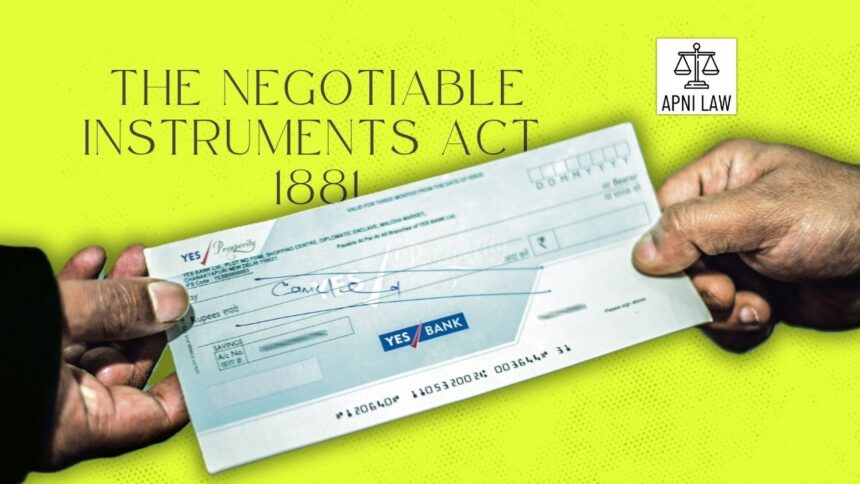Introduction
The Negotiable Instruments Act, 1881 (NI Act) is a crucial legislation in India that governs promissory notes, bills of exchange, and cheques. Enacted to facilitate the smooth functioning of commercial transactions, this Act provides a legal framework for the transfer and settlement of financial instruments. Over the years, landmark judgments in cheque bounce cases by Indian courts have significantly influenced the interpretation, application, and evolution of this Act.
Ajitsinh Chehuji Rathod v. State of Gujarat & Anr. (January 29, 2024)
The Supreme Court affirmed that under Section 118(e) of the Negotiable Instruments Act (NI Act), there is a statutory presumption that the cheque and its indorsements are genuine. The burden lies squarely on the accused to rebut that presumption through credible evidence (e.g. bank‐maintained specimen signatures). Rathod’s request for handwriting expert analysis and postal verification was rejected at the trial and appellate stages. The Supreme Court observed that such additional evidence via Section 391 CrPC is discretionary and should only be granted. This was when due diligence was shown and evidence wasn’t obtainable earlier. Since Rathod failed to question the bank official or timely challenge proceedings, the lower courts’ decisions were upheld.
Sri Dattatraya v. Sharanappa (August 7, 2024)
The Supreme Court affirmed acquittals rendered by both the Trial Court and Karnataka High Court and refused intervention. Thus, stressing that absent legal perversity or gross misappreciation of evidence, concurrent findings are binding. The Bench emphasized that Section 139 creates a presumption in favor of the payee. The accused’s burden of rebuttal is not at the standard of “beyond reasonable doubt”, it suffices to provide credible, preponderant evidence. Once rebuttal succeeds, the burden shifts back to the complainant.
Dashrath Rupsingh Rathod v. State of Maharashtra & Anr. (August 1, 2014)
In this foundational decision, the Court clarified territorial jurisdiction under Section 138. The “offence” is complete once the cheque is dishonoured, and cognizance may be taken by any Court in whose jurisdiction any one of the components (presentation, dishonour, notice, or non‑payment) occurred. This ruling overruled earlier broad interpretations and narrowed jurisdiction. Generally, the complaint should be filed where the drawee bank is located, preventing forum shopping while recognizing that constituent acts may occur in separate places.
What Are Other Clarifications on Evidentiary Burden
Courts have confirmed that the accused is not required to despose as witnesses. Thus, producing reliable documentary or expert evidence is sufficient to discharge the presumption under Section 118(e)/139. Although not addressed explicitly in the above cases, jurisprudence acknowledges that security cheques issued as collateral, not to discharge debt, and improperly used by non‑payees may lead to acquittal. This principle is well‑settled in related Section 138 case law.
Rangappa v. Sri Mohan (2010)
Once a cheque is issued and dishonoured, it is presumed to be issued for discharge of debt or liability, and the burden shifts to the accused to rebut this under Section 139. The standard required is “preponderance of probabilities”, not beyond reasonable doubt. This case is often regarded as the foundational authority for the evidentiary shift mechanism in cheque bounce matters.
Kishan Rao v. Shankargouda (2018/2019)
Mere denial of liability by the drawer is insufficient. To successfully rebut the presumption under Section 139, the accused must present documentary or oral evidence. This creates a reasonable doubt about the existence of debt. Reinforces that defendants must go beyond simple denials to discharge their burden, solidifying what constitutes adequate rebuttal.
Sunil Todi v. State of Gujarat (2021)
The Supreme Court held that a security cheque issued for securing a debt or loan, even if not intended for immediate payment, can still be subject to liability under Section 138 if a legally enforceable debt existed at the time of presentation. The Court distinguished prior rulings like Indus Airways and clarified that whether a cheque is “security” is a trial‑level question of fact, not a legal bar. Clarifies that “security cheques” do not intrinsically immunize the drawer from liability if there’s an underlying debt.
Conclusion
The Negotiable Instruments Act continues to evolve, largely due to judicial activism and progressive interpretations by the Supreme Court and High Courts. For anyone dealing with negotiable instruments, understanding these judicial precedents is essential for legal compliance and protection of rights.







